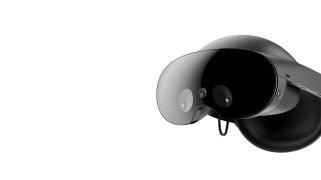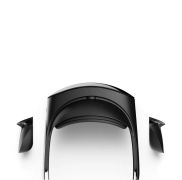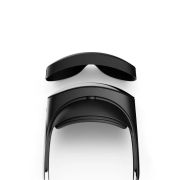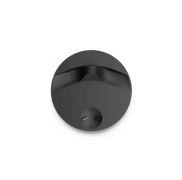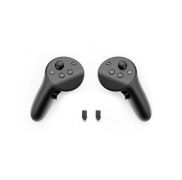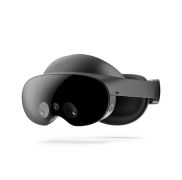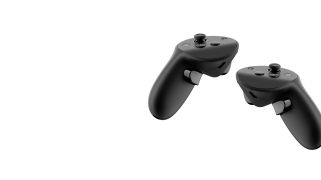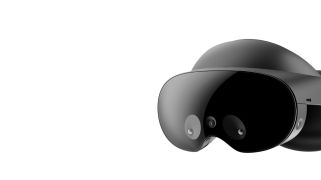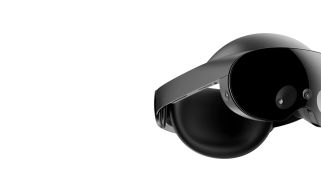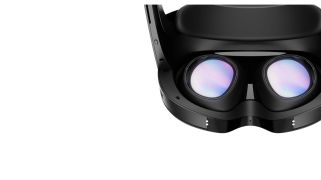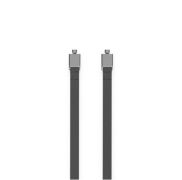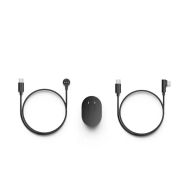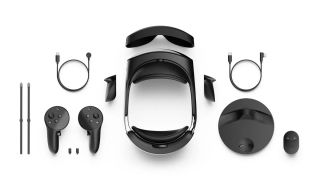Meta Quest Pro: Difference between revisions
Xinreality (talk | contribs) No edit summary |
Xinreality (talk | contribs) Tag: Undo |
||
| (18 intermediate revisions by 2 users not shown) | |||
| Line 1: | Line 1: | ||
{{Device Infobox | {{Device Infobox | ||
|image = [[File: | |image = [[File:meta quest pro6.jpg|300px]] | ||
|VR/AR = [[Virtual Reality]], [[Mixed Reality]] | |VR/AR = [[Virtual Reality]], [[Mixed Reality]] | ||
|Type = [[Head-mounted display]] | |Type = [[Head-mounted display]] | ||
| Line 10: | Line 10: | ||
|Announcement Date = October 28, 2021 (as Project Cambria) | |Announcement Date = October 28, 2021 (as Project Cambria) | ||
|Release Date = October 25, 2022 | |Release Date = October 25, 2022 | ||
|Price = Original: $ | |Price = Original: $1499 / £1499 / AU$2499, Reduced: $999 / £999 / AU$1729.99, Discontinued in January 2025 | ||
|Website = | |Website = https://forwork.meta.com/quest/quest-pro/ | ||
|Versions = Single model (Black, 256GB) | |Versions = Single model (Black, 256GB) | ||
|Requires = [[Meta account]] | |Requires = [[Meta account]] | ||
|Predecessor = [[Meta Quest 2]] | |Predecessor = [[Meta Quest 2]] | ||
|Successor = None direct (Discontinued) | |Successor = None direct (Discontinued in January 2025), [[Meta Quest 3]] | ||
|Operating System = Android-based | |Operating System = Android-based | ||
|Chipset = [[Qualcomm Snapdragon XR2+]] | |Chipset = [[Qualcomm Snapdragon XR2+]] | ||
| Line 46: | Line 46: | ||
|Adjustable Diopter = No | |Adjustable Diopter = No | ||
|Passthrough = Full-color Mixed Reality passthrough | |Passthrough = Full-color Mixed Reality passthrough | ||
|Tracking = [[6DoF]] [[Inside-out tracking]], with 5 external headset cameras and controller cameras | |Tracking = [[6DoF]], [[Inside-out tracking]], with 5 external headset cameras and controller cameras | ||
|Tracking Frequency = Not specified in sources | |Tracking Frequency = Not specified in sources | ||
|Base Stations = Not required | |Base Stations = Not required | ||
| Line 56: | Line 56: | ||
|Positional Tracking = Yes, 6DoF | |Positional Tracking = Yes, 6DoF | ||
|Update Rate = Not specified in sources | |Update Rate = Not specified in sources | ||
|Tracking Volume = Room-scale, defined by | |Tracking Volume = Room-scale, defined by Guardian system | ||
|Play Space = Minimum 6.5 x 6.5 feet recommended for some experiences | |Play Space = Minimum 6.5 x 6.5 feet recommended for some experiences | ||
|Latency = Not specified in sources | |Latency = Not specified in sources | ||
| Line 65: | Line 65: | ||
|Connectivity = [[Wi-Fi 6E]], [[Bluetooth 5.2]] | |Connectivity = [[Wi-Fi 6E]], [[Bluetooth 5.2]] | ||
|Ports = USB-C (for data/power), charging contacts | |Ports = USB-C (for data/power), charging contacts | ||
|Wired Video = Yes, via | |Wired Video = Yes, via Oculus Link (USB-C cable required, sold separately for PC VR) | ||
|Wireless Video = [[Air Link]], [[Virtual Desktop]] | |Wireless Video = [[Air Link]], [[Virtual Desktop]] | ||
|WiFi = Wi-Fi 6E (802.11ax) | |WiFi = Wi-Fi 6E (802.11ax) | ||
| Line 86: | Line 86: | ||
}} | }} | ||
The '''Meta Quest Pro''' (codenamed '''Project Cambria''' during development<ref name="vrcompare_specs"></ref>), is a [[Standalone VR|standalone]] | The '''Meta Quest Pro''' (codenamed '''Project Cambria''' during development<ref name="vrcompare_specs"></ref>), is a [[Standalone VR|standalone]] [[Virtual Reality|virtual reality]] (VR) [[head-mounted display]] (HMD) developed by [[Reality Labs]], a division of [[Meta Platforms]].<ref name="verge_review"></ref><ref name="xrtoday_review"></ref> Announced initially as Project Cambria in October 2021<ref name="vrcompare_specs"></ref> and fully unveiled in October 2022,<ref name="xrtoday_review"></ref> it was released on October 25, 2022.<ref name="cnet_review"></ref><ref name="vrexpert_review"></ref><ref name="vrcompare_specs"></ref> It represented Meta's first major push into the high-end and enterprise VR market, positioned above the consumer-focused [[Meta Quest 2]].<ref name="verge_review"></ref><ref name="xrtoday_review"></ref><ref name="cnet_review"></ref> Key features included [[Pancake lenses]], full-color [[passthrough]] for mixed reality, and integrated [[Eye tracking]] and [[Face tracking]].<ref name="verge_review"></ref><ref name="techradar_review"></ref><ref name="xrtoday_review"></ref><ref name="pcmag_review"></ref> The headset was officially discontinued by Meta in January 2025.<ref name="roadtovr_discontinued"></ref><ref name="gamesindustry_discontinued"></ref> | ||
==History== | ==History== | ||
| Line 122: | Line 122: | ||
===Controllers=== | ===Controllers=== | ||
The Quest Pro includes redesigned controllers called '''Meta Quest Touch Pro Controllers'''.<ref name="tomsg_review"></ref><ref name="xrtoday_review"></ref><ref name="cnet_review"></ref><ref name="vrexpert_review"></ref><ref name="forwork_page"></ref> A major change is the removal of the tracking rings seen on previous Quest controllers.<ref name="verge_review"></ref><ref name="techradar_review"></ref><ref name="pcmag_review"></ref><ref name="cnet_review"></ref><ref name="vrexpert_review"></ref><ref name="uploadvr_review"></ref> Instead, each controller incorporates three built-in cameras and its own [[Qualcomm Snapdragon 662]] mobile processor, enabling independent [[Inside-out tracking|self-tracking]].<ref name="tomsg_review"></ref><ref name="techradar_review"></ref><ref name="gamesradar_review"></ref><ref name="cnet_review"></ref><ref name="engadget_review"></ref><ref name="vrexpert_review"></ref><ref name="vrcompare_specs"></ref><ref name="uploadvr_review"></ref> This allows for full 360-degree tracking, even when the controllers are outside the headset's direct line of sight ( | The Quest Pro includes redesigned controllers called '''Meta Quest Touch Pro Controllers'''.<ref name="tomsg_review"></ref><ref name="xrtoday_review"></ref><ref name="cnet_review"></ref><ref name="vrexpert_review"></ref><ref name="forwork_page"></ref> A major change is the removal of the tracking rings seen on previous Quest controllers.<ref name="verge_review"></ref><ref name="techradar_review"></ref><ref name="pcmag_review"></ref><ref name="cnet_review"></ref><ref name="vrexpert_review"></ref><ref name="uploadvr_review"></ref> Instead, each controller incorporates three built-in cameras and its own [[Qualcomm Snapdragon 662]] mobile processor, enabling independent [[Inside-out tracking|self-tracking]].<ref name="tomsg_review"></ref><ref name="techradar_review"></ref><ref name="gamesradar_review"></ref><ref name="cnet_review"></ref><ref name="engadget_review"></ref><ref name="vrexpert_review"></ref><ref name="vrcompare_specs"></ref><ref name="uploadvr_review"></ref> This allows for full 360-degree tracking, even when the controllers are outside the headset's direct line of sight (for example behind the user's back), and prevents the controllers from occluding each other when held close together.<ref name="tomsg_review"></ref><ref name="community_forums_review"></ref><ref name="vrexpert_review"></ref><ref name="uploadvr_review"></ref> Tracking accuracy was generally praised as excellent and robust.<ref name="community_forums_review"></ref><ref name="engadget_review"></ref><ref name="vrexpert_review"></ref><ref name="uploadvr_review"></ref> Users reported minimal issues, even in varied lighting conditions.<ref name="vrexpert_review"></ref> | ||
The controllers feature improved [[Haptics|haptic feedback]], termed "TruTouch Haptics," including primary motors in the handle and secondary motors under the index trigger and thumb grip area, allowing for more localized and nuanced feedback.<ref name="tomsg_review"></ref><ref name="xrtoday_review"></ref><ref name="engadget_review"></ref><ref name="uploadvr_review"></ref> They retain capacitive sensors on the buttons, thumbstick, and trigger for partial finger tracking.<ref name="vrcompare_specs"></ref><ref name="uploadvr_review"></ref> A new pressure sensor on the thumb rest enables pinching gestures.<ref name="uploadvr_review"></ref> | The controllers feature improved [[Haptics|haptic feedback]], termed "TruTouch Haptics," including primary motors in the handle and secondary motors under the index trigger and thumb grip area, allowing for more localized and nuanced feedback.<ref name="tomsg_review"></ref><ref name="xrtoday_review"></ref><ref name="engadget_review"></ref><ref name="uploadvr_review"></ref> They retain capacitive sensors on the buttons, thumbstick, and trigger for partial finger tracking.<ref name="vrcompare_specs"></ref><ref name="uploadvr_review"></ref> A new pressure sensor on the thumb rest enables pinching gestures.<ref name="uploadvr_review"></ref> | ||
| Line 208: | Line 208: | ||
The Quest Pro acted as an important development platform, allowing creators to experiment with MR, eye tracking, and face tracking capabilities, preparing the ecosystem for future hardware iterations.<ref name="cnet_review"></ref><ref name="uploadvr_review"></ref> | The Quest Pro acted as an important development platform, allowing creators to experiment with MR, eye tracking, and face tracking capabilities, preparing the ecosystem for future hardware iterations.<ref name="cnet_review"></ref><ref name="uploadvr_review"></ref> | ||
==Images== | |||
<gallery mode="packed"> | |||
File:meta quest pro1.jpg | |||
File:meta quest pro10.jpg | |||
File:meta quest pro9.jpg | |||
File:meta quest pro8.jpg | |||
File:meta quest pro7.jpg | |||
File:meta quest pro6.jpg | |||
File:meta quest pro5.jpg | |||
File:meta quest pro2.jpg | |||
File:meta quest pro3.jpg | |||
File:meta quest pro4.jpg | |||
File:meta quest pro11.jpg | |||
File:meta quest pro12.jpg | |||
File:meta quest pro13.jpg | |||
</gallery> | |||
==See Also== | ==See Also== | ||
Latest revision as of 10:32, 8 January 2026
| Meta Quest Pro | |
|---|---|
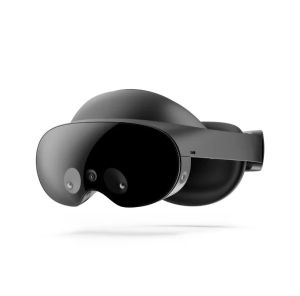
| |
| Basic Info | |
| VR/AR | Virtual Reality, Mixed Reality |
| Type | Head-mounted display |
| Subtype | Standalone VR |
| Platform | Meta Quest |
| Creator | Meta Platforms |
| Developer | Reality Labs |
| Manufacturer | Meta Platforms |
| Announcement Date | October 28, 2021 (as Project Cambria) |
| Release Date | October 25, 2022 |
| Price | Original: $1499 / £1499 / AU$2499, Reduced: $999 / £999 / AU$1729.99, Discontinued in January 2025 |
| Website | https://forwork.meta.com/quest/quest-pro/ |
| Versions | Single model (Black, 256GB) |
| Requires | Meta account |
| Predecessor | Meta Quest 2 |
| Successor | None direct (Discontinued in January 2025), Meta Quest 3 |
| System | |
| Operating System | Android-based |
| Chipset | Qualcomm Snapdragon XR2+ |
| CPU | Octa-core Kryo 585 (1 x 2.84 GHz, 3 x 2.42 GHz, 4 x 1.8 GHz) |
| GPU | Adreno 650 |
| HPU | N/A |
| Storage | |
| Storage | 256 GB |
| Memory | 12 GB LPDDR5 |
| SD Card Slot | No |
| Display | |
| Display | 2 x QLED (LCD with Quantum Dot layer and local dimming) |
| Subpixel Layout | RGB stripe |
| Peak Brightness | Not specified in sources |
| Resolution | 1800x1920 per eye |
| Pixel Density | Peak: 22 PPD (Panel offers 37% more pixels per inch than Quest 2) |
| Refresh Rate | 90 Hz (72 Hz mode available) |
| Persistence | Not specified in sources |
| Precision | Not specified in sources |
| Image | |
| Field of View | 106° horizontal, 96° vertical |
| Horizontal FoV | 106° |
| Vertical FoV | 96° |
| Visible FoV | Diagonal: 95.57° |
| Rendered FoV | Horizontal: 108°, Vertical: 95.57°, Diagonal: 111.24° |
| Binocular Overlap | ~80° |
| Average Pixel Density | ~19 PPD |
| Peak Pixel Density | 22 PPD |
| Foveated Rendering | Yes, dynamic (requires eye tracking enabled) |
| Optics | |
| Optics | Pancake lenses |
| Ocularity | Binocular |
| IPD Range | 55-75 mm hardware adjustable (manual slider) |
| Adjustable Diopter | No |
| Passthrough | Full-color Mixed Reality passthrough |
| Tracking | |
| Tracking | 6DoF, Inside-out tracking, with 5 external headset cameras and controller cameras |
| Tracking Frequency | Not specified in sources |
| Base Stations | Not required |
| Eye Tracking | Yes, via internal cameras |
| Face Tracking | Yes, via internal cameras |
| Hand Tracking | Yes, improved over Quest 2 |
| Body Tracking | Yes, via AI-based API (Movement Estimation) |
| Rotational Tracking | Yes, 6DoF |
| Positional Tracking | Yes, 6DoF |
| Update Rate | Not specified in sources |
| Tracking Volume | Room-scale, defined by Guardian system |
| Play Space | Minimum 6.5 x 6.5 feet recommended for some experiences |
| Latency | Not specified in sources |
| Audio | |
| Audio | Integrated stereo speakers with Spatial audio |
| Microphone | Yes, integrated microphone array (3 mics) |
| 3.5mm Audio Jack | Yes, dual jacks (one on each side) |
| Camera | 5 external cameras (tracking/passthrough), 5 internal cameras (eye/face tracking) |
| Connectivity | |
| Connectivity | Wi-Fi 6E, Bluetooth 5.2 |
| Ports | USB-C (for data/power), charging contacts |
| Wired Video | Yes, via Oculus Link (USB-C cable required, sold separately for PC VR) |
| Wireless Video | Air Link, Virtual Desktop |
| WiFi | Wi-Fi 6E (802.11ax) |
| Bluetooth | 5.2 |
| Power | Integrated rechargeable battery, Charging dock |
| Battery Capacity | Not officially specified |
| Battery Life | Rated 1-2 hours or 2-3 hours depending on usage (eye/face tracking impacts duration) |
| Charge Time | ~2 hours for headset via dock/direct cable |
| Device | |
| Dimensions | 265mm x 127mm x 196mm (strap fully opened) |
| Weight | 722 g (1.59 lbs) |
| Material | Plastic, foam/leatherette padding |
| Headstrap | Integrated rigid Halo strap with rear adjustment dial and battery |
| Haptics | TruTouch Haptics |
| Color | Black |
| Sensors | 5 external cameras (tracking/passthrough), 5 internal cameras (eye/face tracking), IMUs, proximity sensor, controller sensors |
| Input | Meta Quest Touch Pro Controllers, Hand Tracking |
| Compliance | Not specified in sources |
| Size | N/A |
| Cable Length | Charging cable: ~2m (6.5 ft) |
The Meta Quest Pro (codenamed Project Cambria during development[1]), is a standalone virtual reality (VR) head-mounted display (HMD) developed by Reality Labs, a division of Meta Platforms.[2][3] Announced initially as Project Cambria in October 2021[1] and fully unveiled in October 2022,[3] it was released on October 25, 2022.[4][5][1] It represented Meta's first major push into the high-end and enterprise VR market, positioned above the consumer-focused Meta Quest 2.[2][3][4] Key features included Pancake lenses, full-color passthrough for mixed reality, and integrated Eye tracking and Face tracking.[2][6][3][7] The headset was officially discontinued by Meta in January 2025.[8][9]
History
Development of the Quest Pro was first publicly mentioned under the codename "Project Cambria" at Meta Connect 2021 on October 28, 2021.[1] Meta positioned it as a high-end device incorporating next-generation technologies.[10] The final product, named Meta Quest Pro, was officially revealed at Meta Connect 2022 and launched on October 25, 2022.[4][5][1]
The initial launch price was set at $1,499 / £1,499 / AU$2,499, significantly higher than the Quest 2, reflecting its target market of professionals, developers, and early adopters.[11][2][6][7][4][5] In March 2023, Meta permanently reduced the price to $999 / £999 / AU$1,729.99, citing a desire to make the technology more accessible to businesses and professionals, likely also influenced by market competition like the HTC Vive XR Elite.[11][6][3][4][5][1]
Despite the price reduction, the headset reportedly failed to gain significant market traction.[9] In September 2024, Meta announced it was phasing out sales of the Quest Pro alongside the Quest 2.[8][9] By January 2025, the Meta Quest Pro was officially listed as "no longer available" on Meta's website, with the Meta Quest 3 recommended as the alternative for mixed reality experiences.[8][9]
Hardware
Design and Comfort
The Meta Quest Pro features a distinct design compared to the Quest 2, opting for a sleek, all-black finish with a glossy front panel housing external cameras.[6][3][7] It utilizes a Halo strap design, similar to the PlayStation VR or the optional Quest 2 Elite Strap, with padded cushions resting on the forehead and the back of the head.[2][7][4][10][5] The battery is integrated into the rear padding, counterbalancing the weight of the front visor for improved ergonomics compared to the front-heavy Quest 2.[11][6][7][4][10][5] This design makes the headset feel more balanced and secure during use for many users.[12][10] The strap tightness is adjusted via a dial on the rear.[11][7][4]
Despite the balanced design, the Quest Pro is heavier than the Quest 2, weighing 722 grams (1.59 lbs).[11][2][6][3][13][4][5][1] Some users reported discomfort or pressure on the forehead during extended use, potentially requiring careful adjustment or leading to headaches.[2][10][14][5] A top strap, common on other headsets for additional support, is notably absent and not offered as a first-party accessory, although third-party solutions emerged.[15]
Unlike the Quest 2's fully enclosed design, the Quest Pro has an open periphery by default, allowing users to see their real-world surroundings below and to the sides.[2][6][12][10][5] This is intended to enhance mixed reality use cases and reduce feelings of claustrophobia.[12][10] It also improves airflow around the face, reducing lens fogging and heat buildup compared to fully sealed designs.[15][12] Magnetic partial light blockers for the sides are included in the box to increase immersion.[2][6][7][4][5][16] A separate "Full Light Blocker" accessory was sold by Meta for $50 to create a more traditional, fully sealed VR experience, though some reviews noted it needed to be removed for dock charging.[2][6][7][5][17]
The headset accommodates users wearing glasses, featuring an adjustable lens depth dial to move the optics further from the face.[7][4][14][5]
Optics and Display
A key innovation in the Quest Pro is its use of Pancake lenses.[11][2][6][15][3][4][14][5][1] This multi-element optical design allows for a significantly thinner visor (40% slimmer optical stack than Quest 2[16]) and provides improved visual clarity across a larger portion of the lens compared to the Fresnel lenses used in Quest 2.[15][12][18][5][17] This results in a larger "sweet spot" and reduced edge distortion and god rays.[15][12][18][5] Text legibility is notably improved across the entire field of view.[15][12][14]
The headset features two QLED displays (LCD panels enhanced with a Quantum dot layer) with a resolution of 1800x1920 pixels per eye.[11][2][3][4][5][1] While the per-eye resolution is similar to Quest 2, the Quest Pro incorporates local dimming technology with 500 individual zones, significantly improving contrast and enabling deeper black levels than typical LCDs.[6][7][5][1] The Quantum Dot layer also allows for a wider color gamut (130% larger than Quest 2's according to Meta[7]), resulting in more vibrant colors.[6][5][16] The display refresh rate is 90 Hz, with a 72 Hz mode available.[6][3][7][4][10][5][1]
The Field of view (FoV) is approximately 106° horizontal and 96° vertical, an improvement over the Quest 2.[2][13][5][1][17] Interpupillary distance (IPD) is manually adjustable via a continuous slider mechanism, supporting a range from 55mm to 75mm.[3][5][1] While the headset uses eye tracking to guide users to the correct IPD setting, the adjustment itself is not motorized, unlike some competitors.[3][5][17] Some users noted the IPD slider could feel loose and occasionally shift during active use.[2][5][17]
Processor and Memory
The Quest Pro is powered by the Qualcomm Snapdragon XR2+ SoC.[11][6][3][4][5][1] Meta claimed this offered 50% more sustained performance compared to the Snapdragon XR2 found in the Quest 2, primarily due to improved thermal dissipation allowing the chip to run faster for longer.[11][7][4][10][5][16] However, many reviews noted that in practice, performance felt largely similar to the Quest 2 for existing applications, as the underlying GPU (Adreno 650) remained the same and most software wasn't optimized specifically for the 'Plus' variant.[2][5][17] Some users did perceive a noticeable speed difference.
The headset is equipped with 12 GB of LPDDR5 RAM, double the 6 GB found in the Quest 2.[11][6][3][4][5][1] This increased memory allows for smoother multitasking, such as keeping a web browser open while running a VR application.[10][17] It comes with a single storage option of 256 GB.[11][6][3][4][5][1]
Audio
The Quest Pro features integrated speakers built into the head strap arms, providing Spatial audio.[11][3][7][4][10][5][16][1] Reviewers generally found the audio quality to be clear, crisp, and an improvement over the Quest 2, particularly for voice clarity.[11][15][3][18][5] Positional audio cues were effective for immersion.[11][3] However, some noted a lack of bass response, resulting in a "thin" sound profile for certain content.[11][3] For users preferring external audio solutions, the headset includes dual 3.5mm headphone jacks, one on each side.[11][7][10][5][1] An integrated microphone array (3 microphones[1]) is used for voice input and communication.[3][5][16][1]
Controllers
The Quest Pro includes redesigned controllers called Meta Quest Touch Pro Controllers.[11][3][4][5][16] A major change is the removal of the tracking rings seen on previous Quest controllers.[2][6][7][4][5][17] Instead, each controller incorporates three built-in cameras and its own Qualcomm Snapdragon 662 mobile processor, enabling independent self-tracking.[11][6][13][4][10][5][1][17] This allows for full 360-degree tracking, even when the controllers are outside the headset's direct line of sight (for example behind the user's back), and prevents the controllers from occluding each other when held close together.[11][15][5][17] Tracking accuracy was generally praised as excellent and robust.[15][10][5][17] Users reported minimal issues, even in varied lighting conditions.[5]
The controllers feature improved haptic feedback, termed "TruTouch Haptics," including primary motors in the handle and secondary motors under the index trigger and thumb grip area, allowing for more localized and nuanced feedback.[11][3][10][17] They retain capacitive sensors on the buttons, thumbstick, and trigger for partial finger tracking.[1][17] A new pressure sensor on the thumb rest enables pinching gestures.[17]
The controllers have built-in rechargeable batteries, replacing the AA batteries of the Quest 2 controllers.[2][7][13][4][5][1] They are charged via metal contacts, typically using the included charging dock.[2][7][4][5] Battery life is estimated around 8 hours.[15][5][1] A minor drawback noted was a slight delay (a few seconds) for the controllers to sync their position with the headset upon pickup.[2][5][17]
Attachable stylus tips are included, allowing the controllers to be flipped over and used for writing or drawing on virtual surfaces, with haptic feedback simulating surface resistance.[11][3][13][10][5][16] The Touch Pro controllers are also sold separately and are compatible with the Quest 2 and Quest 3 headsets.[2][19][10]
Sensors
The Quest Pro headset is equipped with a total of ten cameras/sensors.[10] Five external cameras are used for 6DoF Inside-out tracking of the headset's position and orientation, Hand tracking, and capturing the mixed reality passthrough view.[7][4][10][5][1] Five internal cameras are dedicated to Eye tracking (one per eye) and Face tracking (capturing upper and lower facial expressions).[15][7][4][5][1][17] These internal sensors enable features like Foveated rendering and more expressive avatars.[2][3][4][5][16]
Battery and Charging
The Quest Pro's integrated battery is located in the rear of the head strap.[11][10][5] Battery life estimates vary between sources, with Meta and some reviews suggesting 2-3 hours,[11][3] while others consistently found it closer to 1-2 hours, or 1.5-2 hours, particularly when features like eye/face tracking and passthrough were active.[2][6][15][7][4][5] This was considered short, especially for a "Pro" device, and lower than the Quest 2's typical runtime.[2][6][7][4][5] The headset can be used while plugged in via its USB-C port for extended sessions.[11][6]
A charging dock is included, designed to charge both the headset and the controllers simultaneously via contact points.[11][2][6][3][13][4][10][5][16][1][17] A full charge for the headset takes approximately 2 hours.[11][6][3][5] Some users found positioning the headset and controllers correctly on the dock could be finicky.[2][7][13][10][14][17]
Features
Mixed Reality (Color Passthrough)
One of the headline features of the Quest Pro is its full-color Mixed Reality passthrough capability, a significant upgrade from the monochrome passthrough on the Quest 2.[11][2][6][15][3][7][4][10][5][16][1] This allows users to see their real-world environment in color while wearing the headset, enabling experiences that blend virtual elements with physical surroundings.[11][6][3][5] The passthrough provides a stereoscopic, depth-correct view of the environment.[17]
While considered a major step forward, reviews consistently noted that the image quality of the passthrough was grainy, somewhat fuzzy, and lacked detail, especially in lower light conditions.[11][2][6][3][4][12][20][5][17] Reading text on phone screens or documents through passthrough was difficult or impossible.[2][12][17] Moving objects like hands could exhibit ghosting or lag effects.[5][17] While sufficient for environmental awareness and basic navigation,[7][12][10] the quality was deemed not high enough for seamless interaction with fine details in the real world.[5][17]
The headset initially lacked automatic room meshing capabilities due to the absence of a dedicated depth sensor (reportedly planned but cut before launch[2][5][17]). Users needed to manually define walls and furniture using a controller-based setup tool for room-aware MR applications, which was considered cumbersome.[2][12][5][17]
Eye and Face Tracking
The Quest Pro was Meta's first headset to incorporate integrated Eye tracking and Face tracking, utilizing five internal cameras.[2][6][15][3][7][4][10][5][16][1][17] Eye tracking enables Foveated rendering, an optimization technique where the headset renders the area the user is directly looking at in higher detail, potentially improving performance and visual quality without increasing processing load.[2][3][4][5][1][17] Eye tracking also helps with automatic IPD calibration guidance.[3][5][17]
Face tracking captures the user's facial expressions (mouth movements, smiles, frowns, eyebrow raises, etc.) and maps them onto their virtual avatar in real-time.[2][15][3][7][4][10][5][16][17] This is intended to make social interactions in VR feel more natural and expressive.[15][3][7][10][16]
While the technology was considered impressive by some,[15][10][5][17] its practical application at launch and throughout the headset's life was limited.[2][6][15][5] Few applications took full advantage of these features.[6][15][18][10][5][17] Some users found the avatar facial expressions could appear uncanny or inaccurate at times, especially over network connections.[12][18][14] Tongue tracking was not supported at launch.[17] Concerns were also raised regarding the privacy implications of collecting eye and facial data, though Meta stated this data was processed on-device and deleted, and the features were opt-in.[7][13][18][16]
Hand Tracking
The Quest Pro supports controller-free Hand tracking, leveraging its external cameras.[2][5][1][17] The tracking quality was considered slightly improved compared to the Quest 2, likely due to better cameras.[6][5][17] Meta also introduced experimental interaction models like "Direct Touch," allowing users to "press" virtual buttons and keyboards with their fingers.[4] However, hand tracking performance could degrade in suboptimal lighting conditions and some found it could still feel jittery or required unnatural hand positions.[20][5][17]
Standalone and PC VR
As a Standalone VR headset, the Quest Pro operates independently without needing a connection to a PC.[4][5] It runs applications downloaded from the Meta Quest Store.[5] It also supports connection to a PC for PC VR experiences, offering higher fidelity graphics powered by the computer's hardware.[20][5] Connection options include:
- Oculus Link: A wired connection using a high-quality USB-C cable (a link-specific cable is recommended and often sold separately).[15][20][5][1]
- Air Link: Meta's official wireless streaming solution, requiring a strong Wi-Fi connection (preferably Wi-Fi 6 or 6E) between the headset and the PC via a router.[15][20][5][1]
- Virtual Desktop: A popular third-party application enabling wireless PC VR streaming and remote desktop access.[5][1]
The Quest Pro includes support for Wi-Fi 6E, which utilizes the 6 GHz band for potentially faster and less congested wireless connections, benefiting Air Link and other wireless features when used with a compatible router.[11][3][5][1]
Software and Ecosystem
The Meta Quest Pro runs on an Android-based operating system (now referred to as Meta Horizon OS), sharing the same core platform and app store as the Meta Quest 2 and Quest 3.[3][20][5][1] It is fully backward compatible with the existing Quest library of games and applications.[6][13][18][10]
While compatible with the large Quest library, a dedicated section for Quest Pro-optimized apps existed but remained sparsely populated throughout its availability.[7][20][10] Few apps were specifically designed to leverage the Pro's unique features like advanced MR, eye tracking, or face tracking.[6][7][4][18][10][5][17] Red Matter 2 was one notable example utilizing Foveated rendering via eye tracking.[3][5][17]
Meta heavily promoted Horizon Workrooms, its virtual collaboration platform, as a key use case for the Pro.[2][3][4][14] Workrooms allows users to meet as avatars, use virtual whiteboards, and project their computer screens onto multiple virtual monitors.[2][3][14] However, reviewers often found the Workrooms software clunky, unintuitive, or buggy, particularly the setup process and integration with real-world devices.[2][3][7][14][5] Horizon Worlds, Meta's social VR platform, also supported the Pro's face tracking features.[2][15][7][14]
The user interface (UI) and user experience (UX) received some criticism for being unintuitive or buggy at times, with some long-standing issues seemingly carried over from the Quest 2 platform.[2][20][14]
For PC VR experiences, the Quest Pro supports connectivity allowing access to PC VR content libraries like SteamVR.[15][5]
Meta also offers Meta Quest for Business, a subscription service aimed at enterprises for managing fleets of headsets, including the Quest Pro, which supports integration with platforms like Microsoft Intune and access to business applications.[3][16]
Reception
The Meta Quest Pro received mixed reviews upon release. Praise was commonly directed towards its hardware innovations:
- Display Clarity & Optics: The Pancake lenses and improved display quality (clarity, color, contrast) were frequently highlighted as significant upgrades over the Quest 2.[6][15][3][12][18][10][14][5]
- Comfort & Design (for some): The balanced Halo strap design was found comfortable by many, especially compared to the Quest 2's default strap.[11][6][13][18][20][10][5] The open periphery design was appreciated for reducing claustrophobia and improving airflow.[15][12][10]
- Controllers: The self-tracking Touch Pro controllers were lauded for their accuracy, improved haptics, and compact design.[2][6][15][3][4][10][5][17]
- Standalone Performance: As a powerful standalone device without PC tethering requirements, its convenience was noted.[6][7][13][10]
However, the headset also faced significant criticism:
- Price: The initial $1,500 price point was widely considered excessive, especially given the limited software taking advantage of its advanced features, making it poor value for most consumers.[11][2][6][3][7][12][4][20][10][5] Even after the price cut to $1,000, it remained expensive compared to alternatives like the Quest 2 or the later Quest 3.[11][6][18][20]
- Battery Life: The short battery life (often 1-2 hours in practice) was a frequent complaint.[11][2][6][3][7][13][4][5]
- Mixed Reality Quality: The color passthrough, while novel, was criticized for its grainy, low-resolution image quality, limiting its practical use.[11][2][6][3][4][12][20][5][17]
- Comfort (for others): Despite the balanced design, the headset's weight and pressure on the forehead caused discomfort or headaches for some users.[2][13][10][14][5]
- Software and Use Cases: A major recurring criticism was the lack of compelling software and clear use cases that justified the Pro's advanced features and high cost. Eye/face tracking felt underutilized, and productivity software like Horizon Workrooms was often described as clunky or unfinished.[2][6][15][3][7][12][4][18][20][10][5][17]
- Target Audience Confusion: Many questioned who the headset was truly for, feeling it was caught between the consumer gaming market (better served by Quest 2/3) and a professional market that wasn't fully ready for its specific feature set or found its implementation lacking.[11][2][3][19][12][18][5]
- Privacy Concerns: The inclusion of eye and face tracking raised privacy concerns among some users and reviewers, given Meta's history with data collection.[13]
Overall, the Quest Pro was seen as an technologically impressive but ultimately niche product – a showcase of future VR/MR technologies that arrived too early, at too high a price, and without the software ecosystem needed to make it essential.[2][6][12][18][10][5] It was often described as feeling like a developer kit or early adopter device rather than a fully realized product for its target market.[5][17]
Discontinuation
In September 2024, Meta confirmed it would stop selling the Quest Pro once existing inventory ran out, alongside the original Quest 2.[8][9] By January 2025, the product was marked as "no longer available" on official channels.[8][9] The Meta Quest 3, launched in October 2023, incorporated some of the Pro's advancements (like pancake lenses and improved color passthrough) at a much lower price point ($499), effectively superseding the Pro for most potential users interested in mixed reality.[6][3][18][20][8][9] While Meta CTO Andrew Bosworth hinted a future "Pro" model wasn't entirely ruled out, reports suggested plans for a direct successor had been cancelled.[8]
Legacy
Despite its limited commercial success, the Meta Quest Pro served as an important technological stepping stone for Meta and the VR/MR industry.[4] It introduced and helped popularize several key hardware advancements that were subsequently adopted or refined in later, more mainstream devices:
- Pancake lenses: Demonstrated the benefits of thinner, lighter optics with improved edge-to-edge clarity, which became a key feature of the Quest 3.[4]
- Full-Color Mixed Reality Passthrough: Paved the way for MR experiences on standalone headsets, influencing the direction of Quest 3 and competitors.[4]
- Eye tracking and Face tracking: Showcased the potential for more immersive social presence and performance optimizations like Foveated rendering, even if widespread software adoption lagged.[3]
- Self-Tracking Controllers: Introduced controllers that didn't rely on headset tracking rings, offering more robust tracking and a more compact design.
- Counterbalanced Design: Highlighted the importance of weight distribution for comfort in standalone headsets by moving the battery to the rear.[10]
The Quest Pro acted as an important development platform, allowing creators to experiment with MR, eye tracking, and face tracking capabilities, preparing the ecosystem for future hardware iterations.[4][17]
Images
See Also
- Meta Quest (product line)
- Meta Quest 2
- Meta Quest 3
- Meta Quest 3S
- PlayStation VR2
- HTC Vive XR Elite
- Pico 4
- Virtual Reality
- Mixed Reality / Augmented Reality
- Eye tracking
- Face tracking
- Meta Platforms
- Reality Labs
- Mark Zuckerberg
References
- ↑ 1.00 1.01 1.02 1.03 1.04 1.05 1.06 1.07 1.08 1.09 1.10 1.11 1.12 1.13 1.14 1.15 1.16 1.17 1.18 1.19 1.20 1.21 1.22 1.23 1.24 1.25 1.26 1.27 1.28 1.29 1.30 1.31 1.32 1.33 1.34 1.35 "Meta Quest Pro specs", VR Compare, Accessed May 3, 2025.
- ↑ 2.00 2.01 2.02 2.03 2.04 2.05 2.06 2.07 2.08 2.09 2.10 2.11 2.12 2.13 2.14 2.15 2.16 2.17 2.18 2.19 2.20 2.21 2.22 2.23 2.24 2.25 2.26 2.27 2.28 2.29 2.30 2.31 2.32 2.33 2.34 2.35 2.36 2.37 2.38 2.39 2.40 2.41 2.42 2.43 2.44 2.45 2.46 2.47 Robertson, Adi, "Meta Quest Pro review: get me out of here", The Verge, Updated November 22, 2022.
- ↑ 3.00 3.01 3.02 3.03 3.04 3.05 3.06 3.07 3.08 3.09 3.10 3.11 3.12 3.13 3.14 3.15 3.16 3.17 3.18 3.19 3.20 3.21 3.22 3.23 3.24 3.25 3.26 3.27 3.28 3.29 3.30 3.31 3.32 3.33 3.34 3.35 3.36 3.37 3.38 3.39 3.40 3.41 3.42 3.43 3.44 3.45 3.46 3.47 3.48 3.49 3.50 Carter, Rebekah, "Meta Quest Pro Review: A Powerful Professional Headset?", XR Today, January 19, 2024.
- ↑ 4.00 4.01 4.02 4.03 4.04 4.05 4.06 4.07 4.08 4.09 4.10 4.11 4.12 4.13 4.14 4.15 4.16 4.17 4.18 4.19 4.20 4.21 4.22 4.23 4.24 4.25 4.26 4.27 4.28 4.29 4.30 4.31 4.32 4.33 4.34 4.35 4.36 4.37 4.38 4.39 4.40 4.41 4.42 4.43 4.44 4.45 4.46 4.47 Stein, Scott, "Meta Quest Pro, Half a Year Later: Caught Between Quest 2 and Quest 3", CNET, March 30, 2023.
- ↑ 5.00 5.01 5.02 5.03 5.04 5.05 5.06 5.07 5.08 5.09 5.10 5.11 5.12 5.13 5.14 5.15 5.16 5.17 5.18 5.19 5.20 5.21 5.22 5.23 5.24 5.25 5.26 5.27 5.28 5.29 5.30 5.31 5.32 5.33 5.34 5.35 5.36 5.37 5.38 5.39 5.40 5.41 5.42 5.43 5.44 5.45 5.46 5.47 5.48 5.49 5.50 5.51 5.52 5.53 5.54 5.55 5.56 5.57 5.58 5.59 5.60 5.61 5.62 5.63 5.64 5.65 5.66 5.67 5.68 5.69 5.70 5.71 5.72 5.73 5.74 5.75 5.76 5.77 5.78 5.79 5.80 5.81 5.82 5.83 5.84 5.85 5.86 5.87 5.88 5.89 5.90 Jakob, "Meta Quest Pro Review", VR Expert, Updated March 15, 2023.
- ↑ 6.00 6.01 6.02 6.03 6.04 6.05 6.06 6.07 6.08 6.09 6.10 6.11 6.12 6.13 6.14 6.15 6.16 6.17 6.18 6.19 6.20 6.21 6.22 6.23 6.24 6.25 6.26 6.27 6.28 6.29 6.30 6.31 6.32 6.33 6.34 6.35 6.36 6.37 6.38 6.39 6.40 6.41 6.42 Hector, Hamish, "Meta Quest Pro review: Meta's best VR headset yet comes at a price", TechRadar, Last updated March 3, 2023.
- ↑ 7.00 7.01 7.02 7.03 7.04 7.05 7.06 7.07 7.08 7.09 7.10 7.11 7.12 7.13 7.14 7.15 7.16 7.17 7.18 7.19 7.20 7.21 7.22 7.23 7.24 7.25 7.26 7.27 7.28 7.29 7.30 7.31 7.32 7.33 7.34 7.35 7.36 Greenwald, Will, "Meta Quest Pro Review", PCMag, Updated November 14, 2022.
- ↑ 8.0 8.1 8.2 8.3 8.4 8.5 8.6 Hayden, Scott, "Meta Officially Discontinues Quest Pro, Its First (and most expensive) Mixed Reality Headset", Road to VR, January 6, 2025.
- ↑ 9.0 9.1 9.2 9.3 9.4 9.5 9.6 Blake, Vikki, "Meta's Quest Pro headset now no longer available", GamesIndustry.biz, January 6, 2025.
- ↑ 10.00 10.01 10.02 10.03 10.04 10.05 10.06 10.07 10.08 10.09 10.10 10.11 10.12 10.13 10.14 10.15 10.16 10.17 10.18 10.19 10.20 10.21 10.22 10.23 10.24 10.25 10.26 10.27 10.28 10.29 10.30 10.31 10.32 10.33 10.34 10.35 10.36 10.37 10.38 10.39 10.40 10.41 Rutherford, Sam, "Meta Quest Pro review: A next-gen headset for the VR faithful", Engadget, October 31, 2022.
- ↑ 11.00 11.01 11.02 11.03 11.04 11.05 11.06 11.07 11.08 11.09 11.10 11.11 11.12 11.13 11.14 11.15 11.16 11.17 11.18 11.19 11.20 11.21 11.22 11.23 11.24 11.25 11.26 11.27 11.28 11.29 11.30 11.31 11.32 11.33 11.34 11.35 Polanco, Tony, "The Meta Quest Pro is awesome, but no way am I working in this thing", Tom's Guide, Last updated July 25, 2024.
- ↑ 12.00 12.01 12.02 12.03 12.04 12.05 12.06 12.07 12.08 12.09 12.10 12.11 12.12 12.13 12.14 12.15 12.16 12.17 12.18 Orland, Kyle, "Meta Quest Pro review: For those with more money than sense", Ars Technica, October 28, 2022.
- ↑ 13.00 13.01 13.02 13.03 13.04 13.05 13.06 13.07 13.08 13.09 13.10 13.11 13.12 13.13 Robertson, Duncan, "Meta Quest Pro review: 'The prologue to a cyberpunk novel'", GamesRadar+, April 14, 2023.
- ↑ 14.00 14.01 14.02 14.03 14.04 14.05 14.06 14.07 14.08 14.09 14.10 14.11 14.12 Zellmer, Matthias, "Meta Quest Pro review: Discounted price makes it a bargain!", NextPit, April 10, 2023.
- ↑ 15.00 15.01 15.02 15.03 15.04 15.05 15.06 15.07 15.08 15.09 15.10 15.11 15.12 15.13 15.14 15.15 15.16 15.17 15.18 15.19 15.20 15.21 15.22 15.23 15.24 15.25 15.26 DaftnDirect (and commenters), "My Quest Pro Review", Meta Community Forums, February 10, 2023.
- ↑ 16.00 16.01 16.02 16.03 16.04 16.05 16.06 16.07 16.08 16.09 16.10 16.11 16.12 16.13 16.14 16.15 "Meta Quest Pro for Business", Meta for Work, Accessed May 3, 2025.
- ↑ 17.00 17.01 17.02 17.03 17.04 17.05 17.06 17.07 17.08 17.09 17.10 17.11 17.12 17.13 17.14 17.15 17.16 17.17 17.18 17.19 17.20 17.21 17.22 17.23 17.24 17.25 17.26 17.27 17.28 17.29 17.30 17.31 17.32 17.33 17.34 17.35 17.36 17.37 17.38 17.39 17.40 17.41 Heaney, David, "Meta Quest Pro Review: New Features For Developers & Early Adopters", UploadVR, October 25, 2022.
- ↑ 18.00 18.01 18.02 18.03 18.04 18.05 18.06 18.07 18.08 18.09 18.10 18.11 18.12 18.13 18.14 de Luna, Elizabeth, "The Meta Quest Pro is not the big fail it's made out to be", Mashable, December 3, 2022.
- ↑ 19.0 19.1 Pitt, Sofia, "Meta's new headset is a very expensive VR experiment that doesn't have a target audience", CNBC, Updated November 11, 2022.
- ↑ 20.00 20.01 20.02 20.03 20.04 20.05 20.06 20.07 20.08 20.09 20.10 20.11 20.12 20.13 Serbezov, Stanislav, "Meta Quest Pro Review: the meaning of 'incomplete'", PhoneArena, Updated April 22, 2024.


